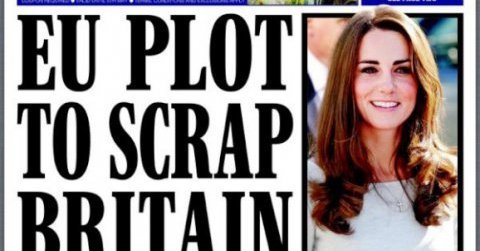The peculiar way in which British media report on the European Union is the subject of endless discussions, and sometimes bitter disputes, amongst those who follow European current affairs in the UK. Supporters of the EU see the press in this country as highly critical at best, and plainly negative at worst, towards the EU. Some print media, such as the Daily Mail and the Daily Express, are widely recognised as anti-EU and all too often tend to distort the reality regarding EU current affairs with inaccurate reports.
The event “Reporting Europe,” organised by King’s College London, was therefore an interesting opportunity to see how some of the most prominent British media responded to the accusations of partiality launched from both the pro and anti sides. The panel of speakers was composed by some very well known names in the world of political journalism: Nick Robinson, BBC Political Editor; George Parker, Political Editor of the Financial Times; John Peet, Europe Editor for The Economist; and Bruno Waterfield, Brussels Correspondent for the Daily Telegraph.
Most members of the panel seemed to agree from the outset that there is indeed a problem with poor reporting of European affairs in the UK, with John Peet and George Parker pointing at the structure of British media ownership as the main culprit. They argued that many UK newspapers put in place a deliberate policy of misleading their readers, in order to follow editorial lines which are ultimately eurosceptic.
Another issue which was mentioned in more than one occasion was a rather technical one, namely the fact that British journalist are – quite paradoxically – limited by their language, as they can often only speak English and therefore tend to rely exclusively on British sources. This seems a very lazy excuse, as English is spoken by all those who work for and around the EU institutions. If this was really the case, it would be unforgivable. Unfortunately, this was not the only lazy excuse mentioned by the distinguished speakers, who argued that EU current affairs are ultimately boring and people in Britain are not interested in what happens in Brussels, unless it has a British twist added to it. However, how can we reconcile this argument with the fact that EU affairs are reported in 27 other member states? Should we really think that people in Poland or Finland are generally more interested in the EU than the British public? And even if this was the case, is it an excuse for poor reporting? You can make up your own mind...
The consensus which had been outlined by the first three speakers was however shattered by the intervention of Bruno Waterfield. Those who follow EU affairs in the UK media will know him as a journalist who represents quite well the archetypical British eurosceptic, and as the successor in Brussels to the current Mayor of London, the flamboyant Boris Johnson – someone known for his engaging but somewhat ‘inventive’ style of reporting the EU. While Waterfield’s intervention oozed mistrust towards the EU, highlighting the typical ‘us vs. them’ mentality of many eurosceptics, he had some interesting things to say. He challenged the view that the EU is too boring or complicated to interest people, and argued that behind what he sees as the grey wall of not-so-transparent legislative procedures and policy processes there are competing issues and ideologies which are of interest to the general public. Beyond the many preconceptions in his discourse, Waterfield made an argument in favour of more ideology in the EU political debate, something which has too often been limited by the consensual style of politics of the European Parliament. Not everybody might agree with this view, but it is one which is shared by an increasing number of supporters of the EU.
While it cannot be said that this event heralded a new era for EU affairs journalism in the UK, it gave the audience a pretty good overview of the position of British media in this field. In a country which is proud of its free press and home to some of the most prestigious journalistic institutions in the world, reporting of EU affairs continues to be a weak spot, and it is unlikely to get better anytime soon. In his closing remarks, Nick Robinson argued that until the issue of Britain’s relationship with the EU is settled the tension between the arguments of pro-Europeans and those of eurosceptics will continue to dominate media reporting. Will this be the case? Don’t hold your breath...

Follow the comments: |
|
